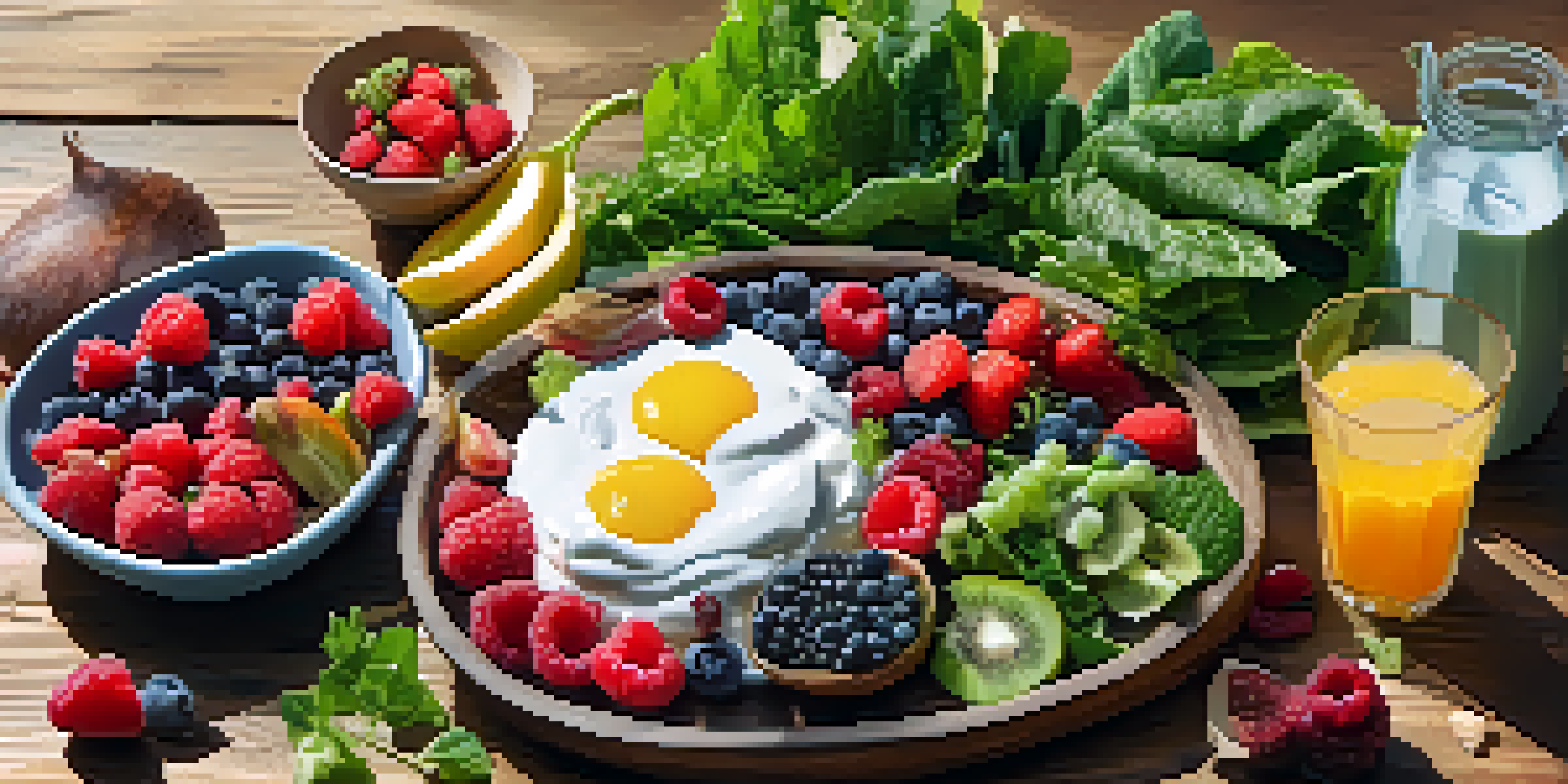How Vegetarian Diets Support Healthy Digestion and Gut Flora

Understanding the Role of Gut Flora in Digestion
Gut flora, or gut microbiota, consists of trillions of bacteria that live in our intestines. These microorganisms play a crucial role in breaking down food and absorbing nutrients. A balanced gut flora can lead to improved digestion and overall health.
Let food be thy medicine and medicine be thy food.
When we eat a varied diet rich in plant-based foods, we nourish these beneficial bacteria. This diversity in our diet helps maintain a healthy balance of gut flora, which is essential for efficient digestion. Think of it like a well-tended garden, where a variety of plants thrive together.
On the flip side, an imbalance in gut flora can lead to digestive issues such as bloating or constipation. A vegetarian diet, by being high in fiber and low in processed foods, helps to keep this balance in check, promoting a healthier digestive system.
Fiber: The Digestive Powerhouse in Vegetarian Diets
Fiber is a key component of vegetarian diets, and it comes in two forms: soluble and insoluble. Soluble fiber, found in foods like oats and beans, helps to slow digestion and regulate blood sugar levels. Insoluble fiber, present in whole grains and vegetables, adds bulk to stool and promotes regular bowel movements.

Including a variety of fiber-rich foods in your diet can make a significant difference in how your digestive system functions. Imagine fiber as a broom that sweeps through your intestines, keeping everything moving smoothly. Without enough fiber, things can get a bit sluggish.
Gut Flora Supports Digestion
A balanced gut microbiota is essential for efficient digestion and overall health.
Moreover, fiber also serves as a food source for gut bacteria, fostering a thriving microbiome. When these bacteria ferment fiber, they produce short-chain fatty acids, which have numerous health benefits, including reducing inflammation and enhancing gut health.
The Benefits of Plant-Based Foods on Gut Health
Plant-based foods are packed with vitamins, minerals, and antioxidants that support overall gut health. Fruits and vegetables, in particular, are rich in polyphenols, which help nourish beneficial gut bacteria. This, in turn, can lead to a more diverse and balanced gut microbiome.
The gut is the seat of all health.
For example, berries and leafy greens are not only nutritious but also have compounds that help fight inflammation. Think of these foods as your gut's best friends, working together to keep everything in check and promote a healthy digestive system.
In contrast, diets high in processed foods can lead to an imbalance in gut flora, potentially causing digestive discomfort. By focusing on whole, plant-based foods, you’re not just feeding your body; you’re also nurturing your gut and its ecosystem.
Probiotics and Prebiotics: Fueling Gut Health
Probiotics are live beneficial bacteria found in fermented foods like yogurt, sauerkraut, and kimchi. These foods can help boost the population of good bacteria in your gut, enhancing digestion and overall gut health. Including probiotics in a vegetarian diet can be a delicious way to support your microbiome.
On the other hand, prebiotics are non-digestible fibers that feed these good bacteria. Foods like garlic, onions, and bananas are excellent sources of prebiotics. Think of prebiotics as the fertilizer that helps your garden of gut bacteria flourish.
Fiber Fuels Digestive Health
Incorporating various fiber-rich foods keeps the digestive system running smoothly and supports gut bacteria.
Together, probiotics and prebiotics create a synergistic effect, promoting a balanced gut flora. By incorporating both into your vegetarian diet, you can ensure that your digestive system is functioning optimally, leading to better health and well-being.
Hydration: A Key Element for Digestive Health
Staying hydrated is crucial for maintaining healthy digestion, especially on a vegetarian diet rich in fiber. Water helps to dissolve soluble fiber, making it easier for your body to absorb nutrients and move waste through your intestines. Think of hydration as the oil that keeps the engine of your digestive system running smoothly.
Moreover, proper hydration helps prevent constipation, a common issue for those who increase their fiber intake without adequate fluids. Drinking enough water can help soften stool and promote regular bowel movements, ensuring that your digestive system remains in tip-top shape.
Incorporating hydrating foods such as cucumbers, oranges, and watermelons into your vegetarian diet can also contribute to your overall fluid intake. Together, these practices create a foundation for healthy digestion and gut flora.
Mindful Eating: Enhancing Digestive Health
Mindful eating is an approach that encourages us to pay attention to our food choices and how we eat. This practice can greatly benefit digestion, particularly on a vegetarian diet. By slowing down and savoring each bite, we allow our bodies to properly digest and absorb nutrients.
Additionally, being mindful can help us recognize how certain foods affect our digestion. Some individuals may find that certain plant-based foods cause discomfort, while others promote well-being. By tuning into our bodies, we can make more informed dietary choices.
Hydration Enhances Digestion
Staying hydrated is crucial for maintaining healthy digestion, especially in a fiber-rich vegetarian diet.
Moreover, mindful eating can reduce stress, which is known to impact digestion negatively. When we eat in a relaxed state, we give our bodies the best chance to digest food efficiently, supporting gut health and overall wellness.
Conclusion: Embracing Vegetarianism for Better Digestion
In conclusion, adopting a vegetarian diet can significantly support healthy digestion and gut flora. With its emphasis on high-fiber foods, plant-based nutrients, and probiotics, vegetarianism offers a holistic approach to gut health. By making mindful choices and prioritizing hydration, you can create a thriving environment for your gut bacteria.
Whether you're a long-time vegetarian or just starting out, incorporating these principles can help you feel your best. Remember that each meal is an opportunity to nourish your body and support your digestive system.

Ultimately, embracing a vegetarian lifestyle can lead to a healthier gut, enhanced digestion, and improved overall well-being. So why not explore the delicious world of plant-based foods and see the positive impact they have on your health?